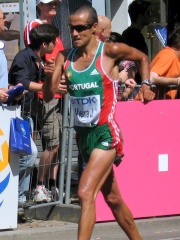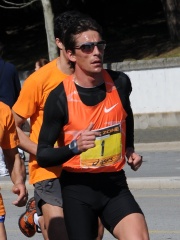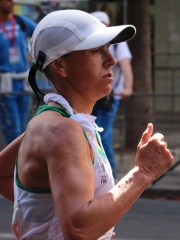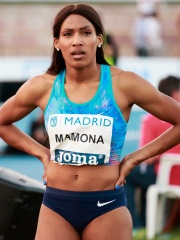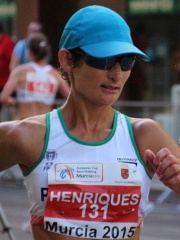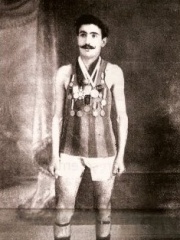
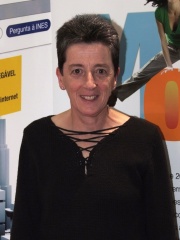




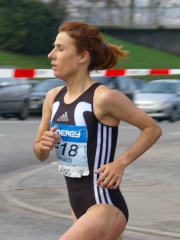

The Most Famous
ATHLETES from Portugal
Top 10
The following people are considered by Pantheon to be the top 10 most legendary Portuguese Athletes of all time. This list of famous Portuguese Athletes is sorted by HPI (Historical Popularity Index), a metric that aggregates information on a biography's online popularity. Visit the rankings page to view the entire list of Portuguese Athletes.

1. Francisco Lázaro (1891 - 1912)
With an HPI of 60.02, Francisco Lázaro is the most famous Portuguese Athlete. His biography has been translated into 24 different languages on wikipedia.
Francisco Lázaro (21 January 1888 – 15 July 1912) was a Portuguese Olympic marathon runner and Portugal's standard-bearer in their first-ever participation at the Olympic Games, the 1912 Summer Olympics in Stockholm, Sweden.

2. Rosa Mota (b. 1958)
With an HPI of 58.68, Rosa Mota is the 2nd most famous Portuguese Athlete. Her biography has been translated into 33 different languages.
Rosa Maria Correia dos Santos Mota, GCIH, GCM (Portuguese pronunciation: [ˈʁɔzɐ ˈmɔtɐ]; born 29 June 1958) is a Portuguese former marathon runner, one of her country's foremost athletes, being the first sportswoman from Portugal to win Olympic gold. Mota was the first woman to win multiple Olympic marathon medals as well as being the only woman to be the reigning European, World, and Olympic champion at the same time. On the 30th Anniversary Gala of the Association of International Marathons and Distance Races (AIMS) she was distinguished as the greatest female marathon runner of all time.

3. Walther Katzenstein (1878 - 1929)
With an HPI of 58.39, Walther Katzenstein is the 3rd most famous Portuguese Athlete. His biography has been translated into 18 different languages.
Walther Katzenstein (8 October 1878 in Lisbon, Portugal – 9 August 1929 in Hamburg) was a German rower who competed in the 1900 Summer Olympics. He was part of the German boat Germania Ruder Club, Hamburg, which won the gold medal in the coxed four final B.

4. Afonso Costa (1871 - 1937)
With an HPI of 58.17, Afonso Costa is the 4th most famous Portuguese Athlete. His biography has been translated into 16 different languages.
Afonso Augusto da Costa, GCTE, GCL (Portuguese pronunciation: [ɐˈfõsu ˈkɔʃtɐ]; 6 March 1871 – 11 May 1937) was a Portuguese lawyer, professor and republican politician.

5. Mário de Noronha (1885 - 1973)
With an HPI of 53.12, Mário de Noronha is the 5th most famous Portuguese Athlete. His biography has been translated into 17 different languages.
Mário de Noronha (15 January 1885 – 9 July 1973) was a Portuguese fencer. He won a bronze medal in the team épée competition at the 1928 Summer Olympics.

6. Jonathan Jones (b. 0)
With an HPI of 49.48, Jonathan Jones is the 6th most famous Portuguese Athlete. Their biography has been translated into 7 different languages.
Jonathan Jones may refer to:

7. António Leitão (1960 - 2012)
With an HPI of 49.11, António Leitão is the 7th most famous Portuguese Athlete. His biography has been translated into 19 different languages.
António Carlos Carvalho Nogueira Leitão OIH (22 July 1960 – 18 March 2012) was a Portuguese athlete who mainly competed in the long-distance events.

8. Fernanda Ribeiro (b. 1969)
With an HPI of 48.75, Fernanda Ribeiro is the 8th most famous Portuguese Athlete. Her biography has been translated into 25 different languages.
Maria Fernanda Moreira Ribeiro, GCIH (Portuguese pronunciation: [fɨɾˈnɐ̃dɐ ʁiˈβɐjɾu]; born 23 June 1969), is a long-distance runner born in Penafiel, Portugal. The pinnacle of her career was at the 1996 Summer Olympics when she won the women's 10000 m gold medal, establishing a new Olympic record of 31:01.63. Her victory gave Portugal its third Olympic gold medal.

9. Manuela Machado (b. 1963)
With an HPI of 48.39, Manuela Machado is the 9th most famous Portuguese Athlete. Her biography has been translated into 20 different languages.
Maria Manuela Machado (born 9 August 1963 in Viana do Castelo) is a former Portuguese long-distance runner, who was particularly successful when running the marathon. Unlike many other marathoners, she did not focus on running lucrative city marathons. Instead, she participated in major competitions (which were less monetarily profitable). Machado participated in the marathon in every major competition between 1990 and 2000. In her first major competition, the 1990 European Championships in Athletics in Split, she placed tenth. She placed seventh in both the 1991 World Championships in Athletics in Tokyo and the 1992 Summer Olympics in Barcelona. Machado won her first medal in a major competition in the 1993 World Championships in Athletics in Stuttgart when she came in second in the marathon. She won the 1994 European Championships in Helsinki and the 1995 World Championships in Gothenburg. In the 1996 Summer Olympics in Atlanta, she once again placed seventh. At the 1997 World Championships in Athens, Machado once again won a silver medal. The next year, in Budapest, she won the European Championships again. Although she placed seventh in the 1999 World Championships in Seville, she only managed a 21st place in the 2000 Summer Olympics in Sydney. Machado represented the Sporting Clube de Braga. She ran her personal best (2:25.09) in the London Marathon in 1999 (and was the third woman to cross the finish line). Machado continued Portugal's successful run in the marathon that Rosa Mota had started. The women's marathon has been part of the European Championships since 1982, and the first time that a non-Portuguese marathoner won the European Championships was at the 2002 European Championships in Munich when Maria Guida of Italy won.

10. Carla Sacramento (b. 1971)
With an HPI of 46.40, Carla Sacramento is the 10th most famous Portuguese Athlete. Her biography has been translated into 21 different languages.
Carla Cristina Paquete Sacramento OIH (born 10 December 1971 in São Sebastião da Pedreira) is a middle distance runner from Portugal.
People
Pantheon has 48 people classified as Portuguese athletes born between 1871 and 2001. Of these 48, 43 (89.58%) of them are still alive today. The most famous living Portuguese athletes include Rosa Mota, Jonathan Jones, and Fernanda Ribeiro. The most famous deceased Portuguese athletes include Francisco Lázaro, Walther Katzenstein, and Afonso Costa. As of April 2024, 2 new Portuguese athletes have been added to Pantheon including Domingos Castro, and António Pinto.
Living Portuguese Athletes
Go to all RankingsRosa Mota
1958 - Present
HPI: 58.68
Jonathan Jones
HPI: 49.48
Fernanda Ribeiro
1969 - Present
HPI: 48.75
Manuela Machado
1963 - Present
HPI: 48.39
Carla Sacramento
1971 - Present
HPI: 46.40
João Vieira
1976 - Present
HPI: 45.61
Domingos Castro
1963 - Present
HPI: 45.48
Rui Silva
1977 - Present
HPI: 44.64
António Pinto
1966 - Present
HPI: 44.02
Susana Feitor
1975 - Present
HPI: 43.24
Patrícia Mamona
1988 - Present
HPI: 43.24
Inês Henriques
1980 - Present
HPI: 43.04
Deceased Portuguese Athletes
Go to all RankingsFrancisco Lázaro
1891 - 1912
HPI: 60.02
Walther Katzenstein
1878 - 1929
HPI: 58.39
Afonso Costa
1871 - 1937
HPI: 58.17
Mário de Noronha
1885 - 1973
HPI: 53.12
António Leitão
1960 - 2012
HPI: 49.11
Newly Added Portuguese Athletes (2025)
Go to all RankingsOverlapping Lives
Which Athletes were alive at the same time? This visualization shows the lifespans of the 5 most globally memorable Athletes since 1700.

